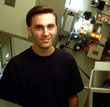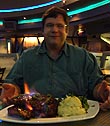|
|
This topic comprises 2 pages: 1 2
|
|
Author
|
Topic: DTS IDEA
|
|
|
|
|
Paul G. Thompson
The Weenie Man

Posts: 4718
From: Mount Vernon WA USA
Registered: Nov 2000
|
 posted 01-17-2001 04:33 PM
posted 01-17-2001 04:33 PM




Brad, I am not expert on computers by any means. Your thoughts have some very good points. However, with all the variables considered in the DTS format, I think there would be some very serious glitches that will cause the system to crash more than it does now. Some of the high end software and computer packages used in the broadcasting industry still puke! For the price that is paid for these units and software (up to 10 grand or so, maybe even higher), you would think it would play a lousy stereo SND or WAV format without any trouble 100% of the time. But, they don't. It is my understanding that the real "Bottleneck" of an IDE system is the drive itself, whether it be the hard drive or CDROM drive. I would presume this is the reason why DTS uses SCSI CDROM's to eliminate the bottleneck. Like I mentioned, I am no expert on these matters. It is just my humble opinion, which is based on what I have seen in some of the broadcasting on-air computers as well as the home entertainment industry. In today's technology, I think the present system that DTS uses for their time code format is probably the most reliable way to go. Educate me Karen. Educate me, Brad. I am all ears... 
| IP: Logged
|
|
Scott Norwood
Film God

Posts: 8146
From: Boston, MA. USA (1774.21 miles northeast of Dallas)
Registered: Jun 99
|
 posted 01-17-2001 05:23 PM
posted 01-17-2001 05:23 PM





My original suggestion was this: keep the DTS hardware pretty much the same as it is now, but add a cheapo IDE hard disk to it. Change the software to allow copying the material on the CDs to the hard disk (maybe copy the soundtracks for the last 4 movies played on that system).The important thing here is that it shouldn't really change the operator's daily routine, and the disks for the movie being shown "should" still be in the machine. The purpose of having the hard disk is threefold: first, to ensure that the film will play in DTS even if it is (for example) doubled up with another DTS feature and the operator neglects to change the disks; second, to help to increase the lifespan of the CD-ROM drives by reducing the wear and tear on their mechanical components (by playing the sound from the hard disk whenever possible, rather than from the CDs); and, third, to allow for situations where the disks may not be available (for example, interlocking one print in multiple DTS-equipped auditoria or for theatres that may get two prints of one title, but only have one set of disks). I agree that SCSI is far preferable to IDE, and it's probably not worth moving to IDE for the CD drives. SCSI drives are generally of higher quality, anyway, and can be more easily interchanged than different makes/models of IDE drives. The real bottleneck, though, is the speed at which the CD-ROM drive is capable of reading the data off the disks, and even the cheapeast hard disk has a far higher throughput rate than the fastest CD-ROM drive in general use. In theory, the software change should be pretty simple, and, even with a good markup for DTS, shouldn't add more than, say, $500 to the cost of the unit. I agree that complexity tends to decrease reliability, which is why I would not advocate making substantial changes to the existing DTS system. If the new component (the hard disk) fails, then it would just work as it always has. The other nice thing about DTS is that, unlike the radio automation systems, there is always a backup (the optical track on the print) except for 70mm and 16mm, which are usually set up with two DTS units, anyway, so failure of the DTS unit wouldn't be catastrophic.
| IP: Logged
|
|
|
|
|
|
|
|
|
|
Michael Barry
Jedi Master Film Handler

Posts: 584
From: Sydney, NSW, Australia
Registered: Nov 1999
|
 posted 01-18-2001 09:22 AM
posted 01-18-2001 09:22 AM




On another note, do you think that DTS might start using DVD-ROM drives? The application that comes to mind is having one disc for each feature instead of two, and using no compression at all. Not that the current DTS system is lacking - not at all! It sounds incredible, but uncompressed could sound even better...what do you think?
| IP: Logged
|
|
|
|
|
|
|
|
Paul G. Thompson
The Weenie Man

Posts: 4718
From: Mount Vernon WA USA
Registered: Nov 2000
|
 posted 01-18-2001 07:45 PM
posted 01-18-2001 07:45 PM




Aaron, you said:"DTS, under normal circumstances, will not even play unless the serial number of the print (I assume that is embedded in the time code) and the serial number of the disc match. Unless both of the 'A' discs had some of the same trailers, which would probably cause something funny to occur." Hmmmm. I am not so sure of that. We have had bad disks in the past, and a replacement disk worked just fine. And, it would be very interesting to see how an IDE hard drive would react when sorting out the codes for a specific movie and play the correct track. Personally, I think go over like a cast iron tennis ball. 
| IP: Logged
|
|
|
|
|
|
|
|
All times are Central (GMT -6:00)
|
This topic comprises 2 pages: 1 2
|
Powered by Infopop Corporation
UBB.classicTM
6.3.1.2
The Film-Tech Forums are designed for various members related to the cinema industry to express their opinions, viewpoints and testimonials on various products, services and events based upon speculation, personal knowledge and factual information through use, therefore all views represented here allow no liability upon the publishers of this web site and the owners of said views assume no liability for any ill will resulting from these postings. The posts made here are for educational as well as entertainment purposes and as such anyone viewing this portion of the website must accept these views as statements of the author of that opinion
and agrees to release the authors from any and all liability.
|

 Home
Home
 Products
Products
 Store
Store
 Forum
Forum
 Warehouse
Warehouse
 Contact Us
Contact Us




 Printer-friendly view of this topic
Printer-friendly view of this topic



















